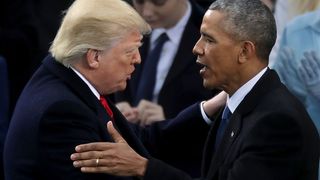Seventh US president Andrew Jackson, whose portrait is prominently on display in the Oval Office these days, was asked in his lame-duck period: was there anything he regretted not doing while in office?
“Yes,” replied Jackson. “I should have shot Henry Clay and hanged John C. Calhoun.” This reference to Jackson’s two principal opponents gives some indication of just how tough presidential politics was back then.
Indeed, the toughest presidential contest was probably that of 1800. Neither of the candidates — Thomas Jefferson and his running mate Aaron Burr, and the opposing ticket of John Adams and Charles Pinckney — won a majority of the electoral college, and when the disputed election went to the House of Representatives for resolution Burr, the subject of Gore Vidal’s brilliant novel of that title, decided to steal the election for himself. He failed, but allegations of skulduggery in American politics have very deep roots.
In 1800, the rival camps deployed charges of treason and murder against their opponents. The social media of the day, being pamphlets, was overwhelmed by the politics of claim and counterclaim. There is little that is new under the American sun.
In 1800, the rival camps deployed charges of treason and murder against their opponents. The social media of the day, being pamphlets, was overwhelmed by the politics of claim and counterclaim. There is little that is new under the American sun.
So today’s impasse is very much in keeping with the traditions. Donald Trump began constructing the narrative for an election loss early this year. People may recall that even in 2016 he made clear that he was not about to observe the customs surrounding an election outcome if he lost.
Trump does not appear to have the capacity to concede defeat — probably the consequence not only of the tutoring of his father, Fred Sr, but also his lifelong mentor, Roy Cohn, who began his political career as an adviser to Senator Joe McCarthy. To concede a defeat would mean Trump being categorised a loser, which would deny him his favourite insult for anyone incurring his ire, including major American allies.
So the tempest should be seen against a backdrop of earlier presidential contests, during which there was widespread vote stealing.
The election of 1876 is probably the worst example of shabby politics overriding electoral decency. A disputed count resulted in Republican Rutherford B. Hayes winning the electoral college over Democrat Samuel Tilden by a single vote (185-184).
To concede a defeat would mean Trump being categorised a loser, which would deny him his favourite insult for anyone incurring his ire, including major American allies.
There was public outrage, with President Ulysses Grant being prepared to deploy US troops to maintain order. But in the “corrupt bargain” that was struck a congressional commission agreed that the Republicans would have the White House and southern Democrats bid farewell to union forces of occupation in three southern states. The Reconstruction era was over and Abraham Lincoln’s inspiring call for malice toward none was lost in the deal.
The George W. Bush-Al Gore dispute before the Supreme Court in 2000 over disputed ballots in Florida is notorious. The margin was about 500 votes and the Supreme Court ruled against a statewide recount by a majority of 5-4.
We should note that former vice-president Gore conceded graciously in the national interest, even though his supporters, including his running mate, Senator Joe Lieberman, wanted to return to the Florida Supreme Court. Gore, like President Jimmy Carter, President George HW Bush and senator John McCain, all understood the value of concession in the broadest possible appreciation of American interest. Their words resonate today.
While visiting Australia, the late Supreme Court Justice Ruth Bader Ginsberg answered a question about the long-term significance of the court’s decision in Bush v Gore. Diplomatically, she responded that she did not think it would be relied on in future.
And, from time to time, there have been US presidential elections that probably should have finished in the courts — 1960 is an outstanding example.
Vote stealing is embedded in the history of the American republic, and in Texas and Illinois in that November, the Democratic ticket of John Kennedy and Lyndon B. Johnson benefited from some intensive vote “harvesting”.
We should note that former vice-president Gore conceded graciously in the national interest, even though his supporters, including his running mate, Senator Joe Lieberman, wanted to return to the Florida Supreme Court.
The machine of mayor Richard Daley Sr in Chicago ran up huge Democratic majorities. So did the Texas Democratic machine of Speaker Sam Rayburn and Johnson. These two states delivered the White House to Kennedy, and vice-president Richard Nixon, the losing Republican candidate, had to decide whether he would challenge. He declined, certainly out of concern for the national interest but also in the knowledge that in some states Republican campaigns also had been actively harvesting votes.
In a voluntary voting system, this is always a danger.
To date, the evidence suggests strongly that this US presidential election was free and fair, with little disruption and few irregularities. Recounts will demonstrate this beyond doubt.
Alexis de Tocqueville, in his magisterial Democracy in America wrote in 1836 that the final frontier in American life would be the courts — an extraordinarily accurate assessment.
This reality actually demonstrates that far from being mortally wounded, American democracy retains residual strength. The courts will make determinations on challenges and the electoral college will meet.
Presidential legend has it that in the open car ride at the 1933 inauguration, outgoing President Herbert Hoover did not speak to President-elect Franklin Delano Roosevelt. But Hoover was there. The only question is whether Trump will be at the Capitol on January 20 for the inauguration of Joe Biden.






